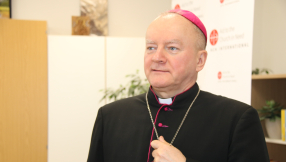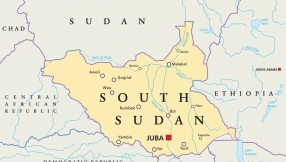I recently watched a TV debate in India about religious conversions. If you know anything about religious conversions in India, then you know it's a highly controversial subject often used to attack Christians.
Half a dozen Indian states have enacted laws against so-called 'forced' or 'fraudulent' conversions, which Christians deny. There have been frightening mob lynching incidents of Muslims accused of 'love jihad', a wild theory that Muslims marry Hindu girls to convert them to Islam. And just recently a 78-year-old prominent Hindu activist was beaten by a mob who alleged he was attending a meeting to encourage India's native tribal people to convert to Christianity.
On the TV debate, spokespersons from India's ruling party accused Christians of targeted proselytisation. As proof, they pointed to a well-known website that lists the world's 'unreached' people groups, those who are yet to hear the gospel. According to the website, most of these groups dwell in India and the Middle East, among the Hindu, Buddhist and Muslim people.
In speaking with leaders of these religious groups I have learned that, though well-intentioned, our missiological language has communicated the opposite of what we've intended. What we hear as a compelling call to witness God's unconditional love to our neighbours, they interpret as a campaign to make one religion dominant over another. Paul's strikingly humble approach to 'become all things to all people' is undermined when people see themselves as 'targets' of overseas organizations.
Part of the confusion stems from the fact that the church developed its missiological language more than 50 years ago, when the West emerged as a political and economic powerhouse and before the advent of the internet. Intended for internal church use, the language has become public, and as such we need to see it in light of those who are now hearing it.
Here are some of the terms the church should reconsider in its missiological language:
1. Unreached
When we say people are 'unreached', we mean the gospel is not immediately accessible to them. Perhaps the Bible hasn't been translated into their language, or there are so few Christians that the gospel hasn't been preached to the larger population. This is what we mean by 'unreached', but what they hear is they are unreached by God.
'Does the West have more of God than we do?' is one of the questions I've heard. The answer is, of course, no. It's obvious parts of Europe and the Americas could be considered unreached given the recent sharp rise in the religiously unaffiliated.
We must remember that, though God works through the church, he is not bound by it. Jesus said the Spirit is like the wind – it goes wherever it pleases. There are countless stories of people from 'unreached' countries who've had visions, dreams and supernatural healings that have led them to Jesus. Just because there isn't a strong Christian presence in a country it doesn't mean God isn't present. There isn't a place that isn't reached by God.
2. People groups
To this day people have a hard time understanding why there's so much ethnic tension in places like Africa, the Middle East and South Asia. It's because people have multiple cultural, ethnic and tribal identities.
Take for example the so-called Bhojpuri people group of north India – 150 million people lumped together because they share the Bhojpuri language. But within the larger Bhojpuri population there are both Bihari Bhojpuri and Uttar Pradesh Bhojpuri who see themselves as distinct from the other. Further there are castes within the Bhojpuri group, including Dalits. A Bhojpuri Brahmin from Bihar may marry a Bhojpuri Brahmin from Uttar Pradesh, but will not marry a Bhojpuri Dalit or low caste. And when it comes to language they read and write in Hindi even as they keep their mother tongue.
There is no such thing as a unified Bhojpuri caste identity, and in this world as a whole, culture does not fit into linear anthropological definitions.
3. Targeting
Targeting might be a straightforward, business-like concept for Christians in the West, but for people who less than a century ago were under colonial rule the term brings memories of religious and political conquest.
Out of this terminology evolved the notion of reaching an entire nation for Jesus, yet there has never been a nation which was fully Christian. Even when Constantine declared Christianity as the official faith of the Roman Empire in the fourth century, Christians constituted no more than a fourth of the entire population.
Jesus himself taught most people would find his teachings difficult, and only a few would follow him and find the 'narrow road' to his Kingdom (Matthew 7:13-14).
4. Conversion
When it comes to conversion, we tend to think of it in individual terms – a personaldecision of faith. However, in collective societies where people's sense of identity comes from their communities conversion takes on a political tone. It could mean you are turning against your local culture, nation or family. In countries such as India, conversion – like targeting – evokes memories of colonial subjugation.
'Regeneration' is a better word to describe the experience of saving faith in Jesus through the Holy Spirit. It captures the idea of coming to new life in Jesus without necessarily implying you're turning against your culture or heritage.
Conclusion: Called to disciple-making
Mahatma Gandhi – the father of modern India – once said, 'I like your Christ, I do not like your Christians.' Gandhi was enamoured of Jesus and his teachings, but one sour encounter with a street preacher who was denigrating Hinduism left him with a bad taste in his mouth toward Christians.
We need to remember that Jesus called us to the long-term process of making disciples, which is the transformation of our lives into the person of Jesus. It matters how we preach the gospel. Our missiological language needs to reflect Jesus. If we're not careful, it can become a major stumbling block to the witness for Jesus. As Peter exhorts us, 'Always be prepared to give an answer to everyone who asks you to give the reason for the hope that you have. But do this with gentleness and respect....' (1 Peter 3:15).
Most Rev Joseph D'Souza is archbishop of the Good Shepherd Church of India-Anglican. He also serves as the president of the All India Christian Council. He is the recipient of numerous awards and accolades for his work as a human and civil rights activist.













